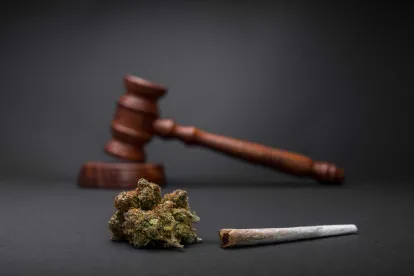Medical marijuana has been legal in DC since 2011. In recent years, the District has adopted piecemeal amendments to its medical cannabis program, largely through temporary emergency legislation and mayoral rulemaking. In recent years, DC has also attempted to legalize adult-use marijuana, but efforts have been blocked by Congress. The pending Medical Cannabis Amendment Act (the Act) promises sweeping, permanent updates to the District’s medical cannabis laws, while it continues to propose adult-use legalization.
What to know:
-
In December 2022, the DC Council unanimously passed a comprehensive reform of its medical cannabis law, which awaits signature by Mayor Muriel Bowser as of the date of publication.
-
Among other things, the bill provides relief to DC medical cannabis operators, including eliminating business licensing caps, allowing for vertical integration, providing tax relief, and clearing a path for licensure of existing illegal operators.
-
It also enhances enforcement by cracking down on property owners who knowingly allow illegal operations on their property and increasing penalties for illegal operators.
The Act was unanimously passed by the DC Council in December 2022, and awaits signature by Mayor Bowser as of the date of publication. If signed, the Act would be the first comprehensive update to the District’s medical cannabis laws. Below is an outline of the Act’s major features.
It consolidates and codifies into permanent legislation previous emergency measures, including:
-
The Medical Marijuana Self-Certification Emergency Amendment Act of 2022, which allowed residents and non-residents 21 and older to self-certify that they have a qualifying medical or dental condition, eliminating the need for a doctor’s recommendation;
-
Mayoral rulemaking adopted in 2019 to extend the registration period for medical cannabis patients and caregivers from one year to two years; and
-
Emergency rulemaking adopted in 2019 to allow District non-residents with medical cannabis cards to purchase medical cannabis while visiting the District.
In addition to codifying previous emergency measures, the Act provides several new opportunities for District operators by:
-
Increasing the amount of medical cannabis that a qualified patient or caregiver can possess at any given time from two to eight ounces;
-
Eliminating the 1,000 plant limit for a cultivation center, allowing for unlimited plant cultivation;
-
Establishing the “4/20 Medical Cannabis Sales Tax Holiday Week” from April 15 through April 24 annually, and authorizing operators to deduct ordinary and necessary expenses from District income taxes that are not authorized under federal income tax rules (section 280E of the Internal Revenue Code); and
-
Creating new license categories, including cultivation centers, manufacturers, retailers (previously dispensaries), internet retailers, testing laboratories, courier licenses for third-party delivery on behalf of a retailer or internet retailer to a qualifying patient or caregiver.
In addition to creating new license categories, the Act authorizes licensees to apply for “endorsements” authorizing specific activities:
-
Safe use treatment facility endorsements allowing a retailer to host on-site consumption by qualified patients and caregivers in a separate and secure location on the premises;
-
Summer garden endorsements allowing a retailer to sell, serve, or allow the consumption of medical cannabis in a private outdoor space;
-
Education tasting endorsements allowing a retailer to offer on-site cooking classes, how-to classes, and tastings for educational purposes to qualified patients and caregivers; and
-
Delivery endorsements allowing a retailer to offer curbside pickup and delivery to qualified patients and caregivers at residences and non-government commercial locations in the District.
While New York’s new cannabis regulations significantly restrict vertical integration, the Act encourages it by:
-
Removing the existing cap on the number of cultivation centers and dispensaries that can locate within a single ward;
-
Allowing currently licensed cultivation centers to receive a manufacturer’s license and apply for a retailer or internet retailer license;
-
Allowing currently licensed dispensaries to receive a cultivation center license and manufacturer’s license;
-
Allowing licensees to hold an unlimited number of manufacture licenses; and
-
Allowing cultivation centers and manufacturers to expand production onto adjacent properties.
However, certain restrictions apply to vertical integration:
-
Testing laboratories may not hold a cultivation center, manufacturer, retailer, internet retailer, or courier license, or vice versa;
-
No licensee may hold more than two cultivation center licenses;
-
No retailer or internet retailer licensee may hold more than three combined total licenses; and
-
No cultivation center licensee may hold more than one retailer or internet retailer license.
The Act advances social equity by:
-
Stipulating that 50% of certain licenses must be set aside for equity applicants and existing medical cannabis operators in perpetuity;
-
Requiring applications for new licensees to be available no later than May 1, 2023;
-
Waiving 75% of any annual or renewal license fee for the first three years of operation; and
-
Instructing the DC Department of Small and Local Business Development to provide equity, grants, and loans to social equity applicants and medical cannabis certified business enterprises.
Finally, operators who wish to convert to a lawful status have ample opportunity to do so. Existing illegal businesses would have 90 days to apply for a license and enforcement action could not be taken for at least 315 days after enactment. Therefore, it should be no surprise that penalties are increased for operators who continue to engage in illegal practices, such as “gifting” medical cannabis in exchange for a “donation.” Property owners that rent to unlicensed businesses will receive notification of the illegal activities and their resulting liability. If a subsequent violation occurs on the property, the property owner would be subject to a fine of $10,000 and would be required to submit a remediation plan to the District.
We will continue to monitor the Medical Cannabis Amendment Act as it makes its way through the legislative process.




 />i
/>i
